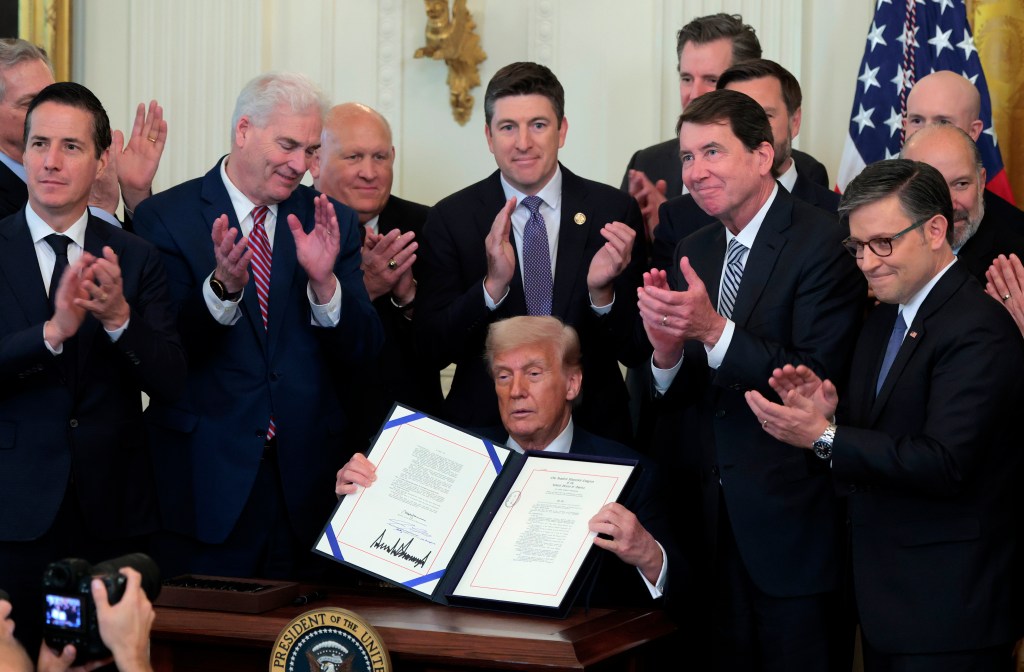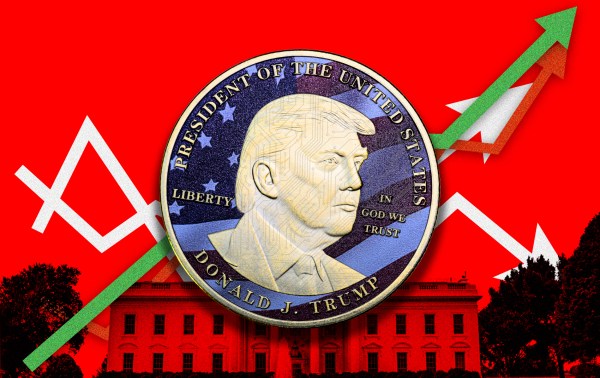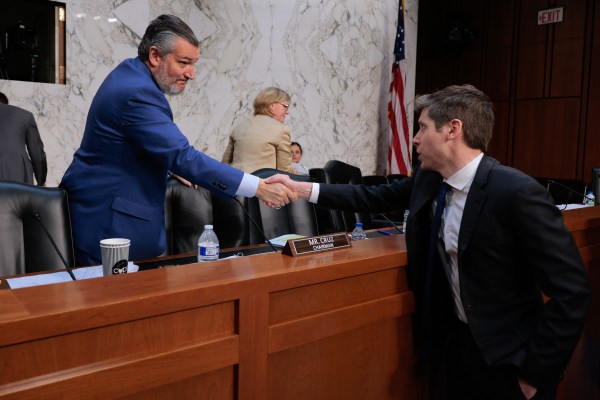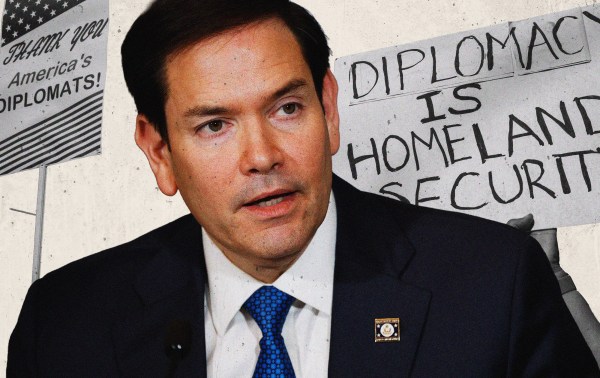“Crypto Week” might not have gone exactly as House Republicans hoped, but after a few procedural delays, President Donald Trump on Friday signed into law the first significant legislation regulating cryptocurrency in American history.
Speaker Mike Johnson planned to vote on and pass three cryptocurrency bills during the week. The GENIUS Act, already passed by the Senate, creates a regulatory framework for a digital stablecoin. The CLARITY Act would set up a market structure for regulating crypto. And the Anti-CBDC Surveillance State Act would prohibit the Federal Reserve from creating a digital currency. The first two enjoyed bipartisan support, and Republicans were united in their backing of the third, so the expectation was that they would all pass smoothly. But the House Freedom Caucus of fiscal hardliners on Tuesday derailed a procedural vote that would have set up passage of the three bills.
Republican holdouts feared the prospect of building a regulated crypto market with GENIUS and CLARITY without a ban on a central bank digital currency (CBDC). They argued a CBDC would enable the government to surveil the buying power of American consumers.
“We feel like we need to be dealing with all this at once and make sure that we’re pretty clear about the central bank digital currency, so we got some more work to do,” Rep. Chip Roy of Texas told reporters after the vote.
House leadership teed up the procedural vote again Wednesday, but the Freedom Caucus held strong. This time, Johnson kept the vote open for nine hours as he lobbied the holdouts, making it the longest vote in the House’s history (a record previously set three weeks ago during the One Big Beautiful Act saga). Ultimately, the two sides came to a deal in which leadership pledged to insert anti-CBDC language into the National Defense Authorization Act (NDAA), which Congress must pass every fiscal year. That convinced the holdouts to advance the bills, and the House passed all three of them Thursday. Trump signed the GENIUS Act Friday, and now the CLARITY Act and Anti-CBDC Act head to the Senate, where their future, and that of cryptocurrency regulation in America, is unclear.
A new direction for crypto policy.
For the crypto industry, the passage of the GENIUS Act is a major milestone on the path to legitimization and broader adoption of digital currency among both consumers and traditional financial institutions. “I think this is a watershed moment for the industry,” Coy Garrison, a partner at the law firm Steptoe and former lawyer at the Securities and Exchange Commission (SEC), told The Dispatch. “It’s an industry that has grown up over the last 10 years with no clear regulatory structure in place.”
In the wake of the collapse of the crypto exchange FTX, the Biden administration took a combative stance toward the crypto industry, opting to prosecute large crypto firms for fraud and securities violations rather than encourage legislative action. “What we saw during the last administration was the use of gray areas of law and the use of enforcement authorities to really discourage the growth of the industry and participation in the industry,” Garrison said.
While there is broad bipartisan support for crypto regulation, some Democrats have expressed concern about the close ties President Donald Trump and his family have to the crypto industry.
For example, World Liberty Financial, a crypto firm controlled by the Trump family, recently launched its own dollar-pegged stablecoin, USD1—a product that could benefit massively from Trump signing the GENIUS Act into law. If new regulations result in an uptick in stablecoin use, USD1 could earn World Liberty Financial and the Trump family hundreds of millions of dollars in transaction fees and interest on reserves.
“That’s been, at least in our conversations behind the scenes, the biggest pushback,” Ron Hammond, former senior director of government relations for the Blockchain Association, told The Dispatch of Democrats’ unease with Trump’s ties to crypto. “The president’s involvement has become a sticking point for many, and kind of a brick wall for some,” Garrison echoed.
Still, Congress has made progress on the issue despite concerns about Trump’s ties to it. The bipartisan GENIUS Act signals a change in how the industry will be regulated moving forward—away from reactive prosecution and toward proactive legislation. “Congress is finally directing agencies to regulate this space, and the rules of the road are being put in place,” Garrison said. Those rules will help players in the crypto industry have greater certainty over compliance requirements, and will give risk-averse financial institutions like traditional banks the green light to begin exploring the space without risk of breaking uncertain laws.
What is the GENIUS Act?
The GENIUS Act creates a regulatory framework for stablecoins, a form of crypto asset that is designed to maintain a constant value, usually by being pegged one-to-one to a currency like the dollar. Because many traditional crypto assets like Bitcoin are highly volatile, stablecoins have become an essential medium of exchange and store of value in the broader crypto ecosystem.
“For most people, it’s really hard to use an asset to make payments if its price goes up and down all the time,” Mark Hays, associate director for cryptocurrency and financial technology at Americans for Financial Reform, told The Dispatch. “You can’t buy a loaf of bread if your Bitcoin is worth two cents one day and two dollars the next, so stablecoins were created in part to try to stabilize the price and value of a set of crypto assets.”
The GENIUS ACT, which passed the Senate with the support of 18 Democrats last month, imposes several significant regulatory requirements. Most importantly, the act formally establishes who regulates stablecoins—primarily the Office of the Comptroller of the Currency—and requires stablecoin issuers to maintain reserves backing their stablecoins on at least a one-to-one basis. These reserves must consist of safe, liquid, and cashlike assets like dollar notes or Treasury bills, and the act requires issuers to publicly disclose redemption policies, publish the composition of their reserves on a monthly basis, and be certified monthly by a registered public accounting firm.
Notably, the act also prohibits issuers from paying interest on their stablecoins—a controversial provision that gained support among many smaller banks that feared competition with yield-paying stablecoins could dry up their own deposits. “The community banks really pushed back [against allowing interest payments], they did a very large push to fight against that,” Hammond said.
The GENIUS Act also determines that all stablecoin issuers will be treated as financial institutions for the purpose of the Bank Secrecy Act—a 1970 law that established compliance requirements and due-diligence processes to combat money laundering, sanctions evasion, and other financial crimes. This inclusion means that issuers will be required to assist U.S. government agencies with efforts to detect and prevent financial crimes, which legislators hope will curb the historic use of stablecoins for sanctions evasion and money laundering.
What’s next?
Stablecoin legislation is a major milestone, but it’s also only the first step down a long and complicated regulatory road for the crypto industry. The main event moving forward will be the CLARITY Act, a market structure bill designed to regulate the broader crypto ecosystem.
Unlike most developed economies, the U.S. takes a bifurcated approach to market regulation. Securities, like stocks and bonds, are regulated by the Securities and Exchange Commission, while derivatives, like commodities futures and swaps, are regulated by the Commodity Futures Trading Commission (CTFC). Under current law, there is no clear guidance on when a digital asset is a security and when it is a commodity, meaning the industry faces widespread uncertainty as to which agency regulates products and what compliance entails. The CLARITY Act seeks to establish the rules of the road and clarify the SEC’s and CFTC’s roles in regulating digital assets.
Because the CLARITY Act covers a much broader segment of the crypto market than the GENIUS Act, its future passage—or the future passage of some other form of market structure legislation—is widely seen within the crypto industry as more important than the regulations established by the GENIUS Act. However, the issue still has a long way to go in the Senate.
House Republicans are keen on getting the CLARITY Act to Trump’s desk. “GENIUS without CLARITY is like having a cell phone without cell towers,” Rep. Glenn Thompson of Pennsylvania, who chairs the House Committee on Agriculture, said at a press conference following the bills’ passage through the House. “GENIUS Act … needs CLARITY to really do its full function.”
A majority of Democrats in the House voted for CLARITY, but their co-partisans in the Senate are likely to make changes. It is unclear how many Senate Democrats are ready to advance CLARITY to Trump’s desk in its current form. Before the House passed its version, Sens. Ruben Gallego of Arizona, Jacky Rosen of Nevada, and Andy Kim of New Jersey—all of whom voted for the GENIUS Act—said they had not delved into it. California Sen. Adam Schiff, another GENIUS Act supporter, said he wanted a different form of the legislation.
“I’m still actually just getting started and talking about what the market structure bill ought to look like,” he told The Dispatch. “I think it certainly isn’t going to be the CLARITY draft, but I’m looking at what’s in that, what’s missing from that.”
Uncertainty around anti-CBDC legislation.
While the GENIUS Act is already law, and the Senate will likely pass some version of market structure legislation akin to the CLARITY Act, the fate of the Anti-CBDC Surveillance State Act is less certain. Only two House Democrats supported it.
While Republicans argue for it based on privacy rights, Rep. Maxine Waters, the top Democrat on the House Financial Services Committee dubbed it the “Anti-Innovation Act.” Her chief complaint was related to a provision of the bill that stops the Federal Reserve from researching the creation of a CBDC, which she argued could make the U.S. dollar less competitive globally. She noted that China has been trying to develop a viable CBDC, which it has implemented to a limited extent. “If this bill passes, the United States would be the only country in the world to ban any research … on CBDCs,” she said in a floor speech. “What are you afraid of? Why don’t you want the knowledge to be held and explained?”
Putting it into the NDAA, a massive and critical bill that Congress must pass each year to authorize expenditures by the Department of Defense, could give Republicans more leverage to push the legislation through and help House leadership hold up its end of the bargain with the Freedom Caucus. The key is that it would need to get 60 votes in the Senate, and it is unclear whether the upper chamber would pass a bill with that provision. Leaders of the Senate Armed Services Committee, which has jurisdiction over the NDAA, were noncommittal about including anti-CBDC language in their key legislation. “We’ll certainly look at it,” Sen. Roger Wicker of Mississippi, the committee’s chairman, told The Dispatch. “I support the bill.”
Sen. Jack Reed of Rhode Island, the top Democrat on the committee, did not say one way or the other whether putting anti-CBDC language into the NDAA would get Democratic support, but he expressed skepticism of Republicans’ measure. “My concern is that the bill, as written here in the Senate, would essentially allow cryptocurrency to displace the dollar as the fiat currency. … All this is so complicated that you have to think carefully about the second- and third-order consequences,” he told The Dispatch. “The [anti-CBDC] bill itself, I think, is terrible, by the way.”
But Sen. Tommy Tuberville of Alabama, a Republican who sits on the committee, was more direct about the possibility of putting the measure into the NDAA.
“That’s not going to happen,” he told The Dispatch.











Please note that we at The Dispatch hold ourselves, our work, and our commenters to a higher standard than other places on the internet. We welcome comments that foster genuine debate or discussion—including comments critical of us or our work—but responses that include ad hominem attacks on fellow Dispatch members or are intended to stoke fear and anger may be moderated.
With your membership, you only have the ability to comment on The Morning Dispatch articles. Consider upgrading to join the conversation everywhere.